CORRUPTION IN JAPAN
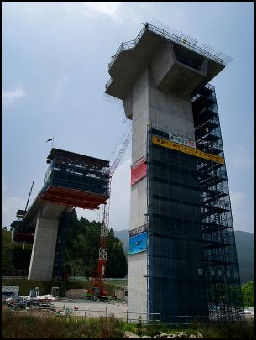
corruption and bid rigging
common in construction industry According to Transparency International Japan was the world's 18th least corrupt nation in a survey of corruption in 180 countries in 2008. It ranked 25th in 1999.
Even so "dirty politics" has been a fixture of Japanese politics for a long time, so much so that people don’t seem to be too particularly outraged by it. Politicians imprisoned on corruption charges have won re-election because they remained popular in their home districts even after the convictions.
Corruption seems to be particularly imbedded in the political culture of Hokkaido. After crackdowns on bid-rigging and kickbacks, people there seem to have been more outraged that their beloved politicians and bureaucrats have been arrested than they have been with corruption taking place. Much of the corruption revolves around construction companies trying to secure money for public works projects. A common practice is for bureaucrats to award a contract to a construction company and for that company to reward the bureaucrat with a high-paying job when he retires from the government.
Small-scale corruption is common. Many people give expensive gifts on an annual basis to their doctors, teachers, professors, bureaucrats, bosses and other people. Some do this as insurance for good treatment, a promotion or job recommendation. American businessmen doing business in Japan say that a little "grease" is necessary to maneuver quickly through the bureaucracy. See Gift Giving, Customs
An investigation found that 46 percent of the $30 million office supply budget for the Chiba prefectural government was misused or improperly spent with some of the money going to buy things like video consoles and ping pong tables.
French President Jacques Chirac has been charged with accepting secret funds while in office and depositing some of the money in a Tokyo bank.
Websites and Resources
Good Websites and Sources: Investigation of Corruption pdf file unafei.or ; Scandals and Corruption pdf file uni-due.de/in-east ; Corruption in Japan and the U.S. unafei.or.jp ;Bureaucratic Corruption in Japan jpri.org/publications ; Transparency Internatiol (Search Japan) transparency.org ;Japan Under Construction e-book escholarship.org ;Police Corruption tokyoprogressive.org ; Corruption Through Political Contributions unpan1.un.org/intradoc ; Wikipedia article on the Lockheed Scandal Wikipedia ; Yakuza in Japanese Politics Harvard Asia Quarterly
Links in this Website: GOVERNMENT AND SYMBOLS IN JAPAN Factsanddetails.com/Japan ; JAPANESE PRIME MINISTER AND PARLIAMENT Factsanddetails.com/Japan ; POLITICS AND ELECTIONS IN JAPAN Factsanddetails.com/Japan ; POLITICIANS IN JAPAN Factsanddetails.com/Japan ; BUREAUCRACY IN JAPAN Factsanddetails.com/Japan ; CORRUPTION AND GOVERNMENT SCANDALS IN JAPAN Factsanddetails.com/Japan ; TAXES, WELFARE AND SOCIAL SECURITY IN JAPAN Factsanddetails.com/Japan ;
Good Government Websites and Sources: Wikipedia article on the Government of Japan Wikipedia ; Wikipedia article on the Japanese Flag Wikipedia ; Government Organization Chart kantei.go.jp and kantei.go.jp/foreign/link/chart ; Statistical Handbook of Japan Government Chapter stat.go.jp/english/data/handbook ; 2010 Edition stat.go.jp/english/data/nenkan ; News stat.go.jp Governments on the WWW — Japan Linksgksoft.com ; Japan Echo, a Journal on Japanese Politics and Society japanecho.com ; Electronic Journal of Japanese Studies japanesestudies.org
Prime Minister, Legislature and Leaders: CIA List of Current World Leaders /www.cia.gov/library ; Kantei, Office of the Prime Minister kantei.go.jp ; Cabinet Office cao.go.jp ; House of Representatives (Shugiin) shugiin.go.jp ; House of Councillors (Sangiin) sangiin.go.jp/ ; National Diet Library ndl.go.jp/en National Diet Building in Tokyo Photos of National Diet Building at Japan-Photo Archive japan-photo.de ; Wikipedia Wikipedia ; Japan Visitor Japan Visitor ; Japanese Lifestyle japaneselifestyle.com.au Constitution Constitution of Japan solon.org/Constitutions/Japan ; Birth of the Constitution of Japan ndl.go.jp/constitution ; Research Commission on the Constitution shugiin.go.jp ;
Lockheed Scandal
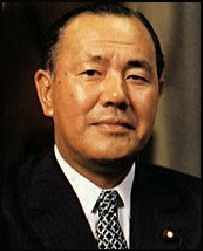
Tanaka, brought
down by scandal During Lockheed Scandal, Prime Minister Kakuei Tanaka was forced to resign in 1974 as a result or corruption allegations. In 1976, he was arrested for taking bribes in the scandal in which the aircraft maker Lockheed channeled funds to top officials in the Japanese government in return for their help in a deal to sell L-1011 Tri-Star jets to All Nippon Airways.
The Lockheed scandal broke in February 1976 when a Lockheed executive, A. Carl Kotchian, testified before the U.S. Congress that Lockheed gave money to foreign officials to selll Lockheed aircraft. The accusation led to the indictments of 16 Japanese politicians, including Tanaka. Kodama Yoshio, one of the founders of the LDP, was charged with accepting huge payments from Lockheed. Tanaka was convicted in a lower court and died in 1993 while appealing his case to the Japanese Supreme Court.
Recruits Scandal
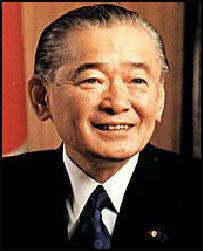
Takeshita, brought
down by scandal Prime Minister Noboru Takeshita was forced out of office in April 1989 after members of his party, the LDP, were implicated in the shares-for-favors Recruits scandal, the worst political crisis in Japan since the end of World War II. LDP leader Shin Kanemaru was among those forced to resign. One of Takeshita’s top aides committed suicide. Many thought he chose suicide to avoid revealing any wrongdoing about his boss.
In the Recruits scandal, LDP lawmakers accepted pre-flotation shares of Recruit Cosmos Co., a real estate subsidiary of the Recruits group, with the understanding the shares would soar in value when the they were listed on the Tokyo stock market. In return the lawmakers granted Recruit favors which helped it expand its business.
Some 70 politicians and insiders purchased stock before the company was listed. When it was listed people already holding stocks made a killing. After the deals became public in 1988, 11 Diet members were investigated on bribery charges but not indicted. The trial for the Recruit scandal lasted for 13 years and involved 322 hearings.
Takeshita resigned as prime minister after taking full responsibility for the Recruits scandal but that wasn’t the only misdeed he was linked to. Later it was discovered that Takeshita's aides had asked the Japanese mafia for help to win an election. In 1993 his closest aid was indicted on tax evasion charges after millions of dollars of gold bullion and bearer bonds were found in his closet.
Recruit Co., a major information and staffing service company, was founded in 1960 by Hiromasa Ezoe, a University of Tokyo student at the time, and initially placed classified ads in university newspapers. The company grew rapidly until 1988, when the stock-for-favors scandal erupted. Ezoe was found guilty of granting unlisted shares in one of the firm's subsidiaries, Recruit Cosmos Co., to politicians, senior bureaucrats and business leaders. [Source: Yomiuri Shimbun, June 27, 2012]
Powerful LDP secretary-general Taku Yamasaki was voted out of office seat after being spotted making late night visits to a 29-year-old women he had earlier denied seeing. Powerful LDP member Koichi Kato retired over allegations that he laundered money through the bank account of his 93-year-old mother. Kato also took some heat when it was revealed his top advisor pressured a construction to build him a new house in return for construction contracts. Kato was voted back into office as an independent in 2003,
“In 1992, Recruit came under the aegis of Daiei Inc., a major supermarket chain whose business subsequently declined. This resulted in Recruit shares being sold to investment funds and other entities from 2000 to 2005. Recruit rebuilt its business by beefing up capital and business partnerships with major advertising companies, TV companies and other firms. The firm's consolidated operating profits in fiscal 2011 stood at 115 billion yen, up 27 percent from the year before, on revenue of 806.6 billion yen, up 7.2 percent. Recruit has aggressively expanded its temporary staffing job information and related operations abroad. In 2012 Recruit announced its planned holding company will list on the Tokyo Stock Exchange or another bourse, probably next fiscal year, more than 20 years after it was embroiled in a stock-for-favors scandal.
Ministry of Finance Sex and Money Scandals in Japan
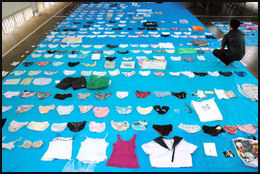
panties seized in a raid Two Ministry of Finance officials were arrested for demanding that bankers take them to "no-pan shabu shabu restaurants," where waitresses in short skirts with no panties serve guests, and for a $100 tip will bend over for the customers. The bankers dished out over $100,000 and in return received warnings of investigations into bad loan scandals.
Other Ministry of Finance officials were reprimanded for taking "naps" with call girls in rooms rented by the MOF. One Finance Ministry official, who was found with 400 pieces of women's underwear in his home, told police, "I picked up all the lingerie on the streets by pure chance."
In April 1998, two former Finance Ministry were indicted for receiving $69,000 in bribes in the form nights out at restaurants and golf trips from five companies. Another 112 Ministry of Finance officials were reprimanded for improperly accepting meals and entertainment. By 2000, there were drastic reductions in wining and dining of bureaucrats.
Construction Corruption in Japan
One of the most common forms of corruption in Japan is kickbacks for construction projects. This form of bribery is one reason why Japan has so many bridges and railway lines but less than half the population is hooked up to sewer lines.
About 90 percent of the road contracts in 2006 involved no bidding. Ex-bureaucrats working for agencies and foundations that won the contracts were involved in special deals and had been hired through the “decent from heaven” system of employing ex-bureaucrats. According to one tally nearly 60 percent of the 1,248 former bureaucrats involved in road work got jobs after they retired with one the top 10 corporate bodies that do road work.
The Osaka-based Kinki Regional Development Bureau, for example, was able to secure 3,820 public works projects worth ¥34.7 billion over five years with the help of 1000 retired officials from the Construction and Transport Ministry. Some of the projects cost more than their market value.
One investigation found that ¥69 million of tax funds earmarked for public works was instead spent on junkets for employees of foundations that do the public works projects.
Koizumi cut state spending on public works. In fiscal 1998 the central government spent about ¥15 trillion on public works projects, By fiscal 2005 that figure had been reduced to ¥8 trillion. During the same time the number of construction companies dropped only slightly, from about 600,000 to around 500,000. With shrinking amounts of money available, construction firms were less likely to form cartels and more likely to seek influence with politicians that awarded contracts.
Earthquake Resistant Building Scandal in Japan
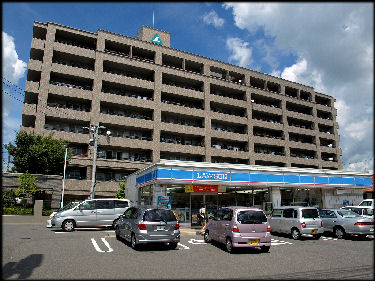
buildings like this were condemned
because earthquake-resistance requirements
were not met and covered up In 2005 and 2006 there was a big scandal over the falsifying of data related to the earthquake resistance of some buildings. Resident of condominiums were forced to move out and hotels were forced to close. Much f the blame was placed on the architect Hidetsugu Aneha, who fabricated the data. Aneha said he was pressured by his clients in the construction industry to fudge the data so they could save money in building costs.
In investigation revealed that Aneha fabricated data for 99 condominiums and hotels, making them susceptible to collapse in a upper 5 level earthquake. The buildings are supposed to be able to withstand level 7 earthquakes.
Aneha reported that the buildings he checked had more steel reinforcing than they actually had. Aneha said he did it because was asked by the manager of a construction company to reduce the amount of steel reinforcement with the understanding that the manager knew that would weaken the building. Aneha said if he didn’t comply he would lose business.
Aneha later said originally faked data to make a name for himself as a cost cutter and then kept on faking data to maintain his reputation. He was sentenced to five years in jail. The scandal raised questions about the credibility of the construction industry as a whole and hurt the properties business.
Bid Rigging in Japan
Bid-rigging is a fact of life of life in the clubby world of Japanese politics and business. There have been a number of bid-rigging scandals involving construction firms over the building of bridges, tunnels, and roads.
In some cases cartels are formed and bids are divided out among cartel members without competitive bidding taking place. Moe than 70 percent of the steel projects for steel bridges given out between 1999 and 2004 by the Japan Highway Public Corporation were won by 47 companies, who belong to two bid-rigging associations: K-kai and A-kai. Their bids were almost exactly the same as the public corporation estimates.
In 2006 three prefectural governors were arrested and forced to resign because of bid-rigging scandals. They were Tadahiro Ando of Miyazaki Prefecture, for helping an engineering company win a contract for disaster reconstruction project; Yoshiki Kimura of Wakayama Prefecture, who received bribes from golf course operators and was involved in bid-rigging for sewage and construction projects; and Eisaku Sato of Fukushima Prefecture, arrested in connection to bid-rigging and accepting bribes linked to a dam project.
Other Scandals in Japan
The Foreign Ministry was once believed to be above scandal. In 2001, it was revealed that one Foreign Ministry official embezzled about $4 million and used they money to buy race horses and a golf club membership. Another used an expensive limousine during the G8 summit in Okinawa in 2000. Yet another, posted in Colorado, was dismissed for misusing ministry funds.
In June 2007, former intelligence chief Shihetake Ogata was arrested in connection with a shady deal involving the aborted purchase of the head office of the pro-Pyongyang Korean group Chingryon. Ogata and his associates were charged with defrauding Chongryon out of its land.
Despite running up costs and pouring money into wasteful projects that risked bankrupting the government the Osaka municipal government kept a slush fund with at least ¥281 million that in some cases was used by employees for their personal expenses,
In 2009, an electronics retailer called Best Co, had itself designated as organization for the disabled so that it could send sales flyers with a postal discount given to such organizations, saving the company millions of dollars, between 2001 and 2009 when it engaged in the practice. The scam was made possible, investigators say, by a female bureaucrat in a bureau of the Welfare Ministry — Atsuko Muraki — who not only put her seal on documents that abetted the scam but forged the seal of her superiors.
Scandals and Suicides Under Prime Minister Abe
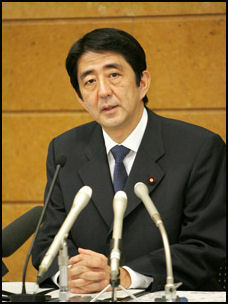
Abe, brought down by
scandals and a suicide Prime Minister ShinzoAbe’s administration was rocked by a series inappropriate remarks, blunders and corruption scandals. Weeks after taking office Abe was hurt by controversial remarks by his ministers — a health minister calling women “baby-making machines” and defense ministers criticizing the invasion of Iraq by close ally the United States. Abe was also hurt by the revelation that a tax commissioner that he appointed was using public housing to meet his girlfriends even though he criticized the use of public housing by ordinary government workers.
In July 2007, Defense Minster Fumio Kyuma was forced to resign because of criticism over remarks he made that the U.S. atomic bombings of Hiroshima and Nagasaki was justifiable and unavoidable. During a lecture he said, “I understand the bombings brought the war to an end, I think it was something that couldn’t be helped as it was aimed at preventing the Soviet Union from entering the war.” The gaffe reinforced the feelings that the Abe administration was inept.
In May 2007,Agriculture, Forestry and Fisheries Minister Toshikatsi Matsuoka, committed suicide by hanging himself at a housing complex used by lawmakers in Tokyo. He had been criticized by the opposition for dubious uses of his office expenses and questionable spending by an association he was affiliated with. Before the suicide he was scheduled to face tough questions on the spending of $240,000 over five years on water, heating and other expenses that are provided free to lawmakers and his claim that the money had been spent on “some kind of deoxidized water.” It was the first time since World War II that an acting cabinet minister committed suicide.
Two Agriculture, Forestry and Fisheries ministers that followed Matsuoka — Norihiko Akagi and Takehikiko Endo — were forced to resign because corruption scandals. Akagi was unable to explain $730,000 in expenses filed by a support group that listed his parents’s home as its main office. After being shown receipts that showed he double reported expenses, he appeared at a news conference with a big bandage on his left cheek and a smaller bandage on his forehead and refused to explain why. Endo was forced to quit after only eight days in office when reports surfaced about dubious subsidies given to an association he once headed.
Cracking Down on Corruption in Japan
Explaining why more isn’t done to stop corruption, Kimiko Manes, author “Culture Shock in Mind”, wrote in the Daily Yomiuri: “If one’s subordinates or even supervisor are doing something unlawful, the group dynamic becomes complicated. It is hard for the Japanese to speak up as it may lead to the loss of face of for the whole organization. To break the trust of the group, and cause shame for the supervisor...is hard for the Japanese to do. As a consequence Japanese people can be reluctant to become “whistle-blowers”...Even if a whistleblower actions are justifiable, he or she will be persecuted within the organization.”
The Japanese press and media can be quite aggressive in its reportage of scandals and corruption. Television coverage of such activities is often comprehensive and thorough.
Several suicides "dampened enthusiasm" for corruption investigations in 1998. Ministry of Finance official Yoichi Otsuki hung himself with his neckties in his apartment after investigators searched his office. LDP politician Shokei Arai hung himself in Tokyo hotel shortly before he was expected to be arrested for demanding special favors from a brokerage house.
Image Sources: 1) 5) Ray Kinnane 2) 3) 6) Kantai, Office of Prime Minister site, 5) exorsyst blog
Text Sources: New York Times, Washington Post, Los Angeles Times, Daily Yomiuri, Times of London, Japan National Tourist Organization (JNTO), National Geographic, The New Yorker, Time, Newsweek, Reuters, AP, Lonely Planet Guides, Compton’s Encyclopedia and various books and other publications.
Last updated March 2010
